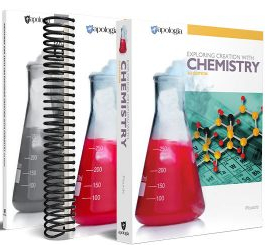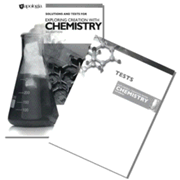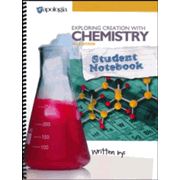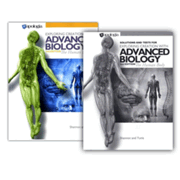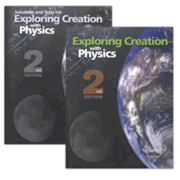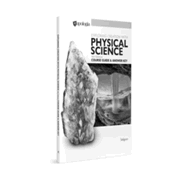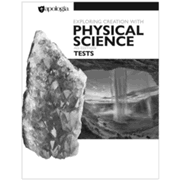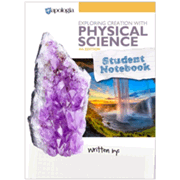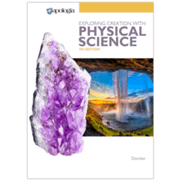Apologia courses are among the best options for college-prep, lab science courses for junior and senior high that allow students to study independently if they wish to. Exploring Creation with General Science and Exploring Creation with Physical Science are junior high courses targeted at grades seven and eight. Exploring Creation with Biology, Exploring Creation with Chemistry, and Exploring Creation with Physics, meet requirements for high school lab courses. Exploring Creation with High School Astronomy is a textbook for an elective course that does not include lab activities or exams. It differs significantly from the other courses, so I am not including it in this review.
Apologia also offers advanced courses in biology, chemistry, and physics. These are to be used after the corresponding foundational course from Apologia. The advanced courses are Advanced Chemistry in Creation, Advanced Physics in Creation, Advanced Biology: The Human Body, and Exploring Creation with Marine Biology. Advanced Physics is printed in only black and white, while the other textbooks are printed in color. (Note that I have not reviewed Advanced Chemistry, Advanced Physics, or Marine Biology.)
I appreciate the options that accommodate a range of student goals—from the non-science-oriented student who just wants the basics to the ambitious, college-bound student who wants advanced-level courses. All courses offer engaging lab experiences.
A Christian worldview permeates these courses. Apologia brings in not just creationist views, but also other scientific issues and ideas in relation to Christianity.
Editions
Physics is still in the second edition, while all other courses are in their third editions. Third edition courses include a student textbook, a student notebook, and a solutions and tests book (which comes packaged with one booklet of student tests). Physics does not have a student notebook. Textbook courses come as two-volume sets. The third edition textbooks are softcover and student notebooks are spiral bound so they will lie flat. The softbound solutions and tests books have answer keys for questions from the student textbook as well as for the tests. Step-by-step instructions for lab experiments appear in each module of the student textbooks near the topics to which they relate.
Third editions of the courses have optional audiobooks—MP3 downloads or CDs with student text content read aloud. Students still need the printed textbook to read along with or refer to as they study and complete their work.
Video Courses
Apologia also offers four options for video instruction for most of their courses.
Self-Paced courses feature professionally-produced video lectures that include animations and video clips. Self-Paced courses are available for General Science, Biology, Chemistry, Advanced Biology, and Marine Biology. A briefer course on Precision and Significant Figures helps students learn how to apply math in science courses. All Self-Paced courses are completely digital, and students can enroll at any time. Aside from the Precision and Significant Figures course, all Self-Paced courses include a digital version of the textbook, audio narration of the textbook, video instruction, directions for completing experiments, study guide materials, assessments, and exams. Apologia also recommends the use of Student Notebooks with Self-Paced courses. The Self-Paced courses allow students to work on their own aside from assistance they might need for the experiments. Tests are scored by the program.
You can purchase a thumb drive with only the video component of the Self-Paced courses. You would use this instruction along with the textbook, Solutions and Tests book, and student notebook.
Some students do better with an instructor and class with whom they can interact. They might do well enrolling in Apologia's online courses that are available in real-time.
Video-on-Demand courses allow students to watch pre-recorded classes. These are unedited recordings of actual classes that include the teacher's presentation, questions, discussions, and administrative issues. Parents need to make and oversee lab assignments, give tests (using the Solutions and Tests book for the course), and evaluate student coursework. You can rent complete courses or individual modules, and you will have access for 12 months. Generally, the recordings will be a previous year's course, but some courses are being recorded that same year, and sessions are made available as soon as possible. If there's a glitch in the recording schedule or technology, it might disrupt your own schedule, so keep this in mind when ordering. As of March 2024, Video-on-Demand courses are available for General Science, Physical Science, Biology, Advanced Biology, Chemistry, Advanced Chemistry, Health and Nutrition, Marine Biology, Physics, and Advanced Physics.
Textbook and Student Notebook Details
All of the Apologia textbooks were written for independent study, addressing students directly. The conversational style of writing makes these texts much easier to read than most others. Brief information for parents or teachers is at the beginning of each solutions and tests book.
High school textbooks are divided into 16 modules, and each module should take two weeks to complete. Modules are divided into several topics and activities. Within each module are “On Your Own” questions. Students are to answer these before they proceed to the next section. Answers are given at the end of each module so that students can self-check their comprehension. At the end of each module is a Study Guide with additional questions. Answer keys are in the solutions and tests book for each course.
The student notebooks for third- and fourth-edition courses have preprinted pages for recording observations and conclusions from labs. There are also pages for taking notes from the textbook and space for writing answers to the textbook's On Your Own and Study Guide questions.
At the end of each textbook are lists of lab materials needed. Apologia specifies lab materials that, for the most part, can be found at grocery and hardware stores. However, the biology and chemistry labs do require some more specific equipment like a scale, microscope, and test tubes. Using some non-traditional lab equipment means students will not be familiar with all of the more complex scientific equipment when they enter college, but this should be a small liability given the practical advantages of this type of lab for homeschoolers. Lab equipment and resources for high school-level courses are available from Apologia.
Course Descriptions
Exploring Creation with General Science
This is a broad general science course for junior high students that includes a significant amount of lab work, conveniently using household items. Topics covered include the history of science, the scientific method, how to perform experiments, simple machines, archaeology, rocks, minerals, fossils, geology, paleontology, evolution and interrelated theories, living organisms, organisms and energy, classifications, and the human body.
Exploring Creation with Physical Science, 4th edition
This textbook offers a user-friendly, yet academically challenging physical science course for homeschoolers. It qualifies as a lab course with extensive experiments and recording activity.
The course begins with an introduction to the basics of science that includes the scientific method, forming and testing hypotheses, conducting experiments, using measurements in science, working with scientific models, and organizing and analyzing data. After that, the course devotes several chapters to chemistry, physics, and earth science--topics typically covered in a physical science course. The fourteenth module, "Chemistry and Physics in the Life Sciences," briefly applies what students have been learning to the realm of living things as it discusses topics such as carbon chemistry, biochemistry, and chemical reactions in cells. The final module guides students through a research project on a topic of their choosing.
The course includes one to four experiments within each module. These are supposed to be done when students encounter them in the textbook, and they should write their notes and observations in their Student Notebook.
The textbook also has one or two "You Do Science" activities in most of the modules for additional hands-on learning. These are fairly similar to the experiments, but they are optional, and they generally require simpler materials and equipment than the other experiments. The experiments use mostly household-type items, but there are some items you might not have on hand such as insulated wire, Styrofoam balls, and a tincture of iodine. A list near the end of the textbook shows everything that is needed for each experiment, and it sometimes gives you alternatives for specialized equipment--such as cutting a CD in half to use in place of a prism.
Exploring Creation with Biology
See the separate review of this course.
Exploring Creation with Chemistry
This text covers essentially the same content as most high school chemistry courses.
Algebra 1 is a prerequisite. While the authors assume that the student has this math background, they do offer some math review. The text presents concepts and guides students through practice exercises before leaving them to work on problems. Solutions to test questions include the math work, so students weak in math can figure out what they might have missed. This sort of help is very rare in chemistry courses.
The author has done a great job constructing lab activities with low-cost equipment while providing enough experience for a solid college-prep course. The labs are exacting in detail, achieving a great deal of precision with minimal equipment.
Apologia sells a Chemistry Glassware Set for this course that provides the basic equipment you need. All of the chemicals you need are available at the grocery, drug, or hardware store. This course has added optional lab work for which you need to purchase a MicroCHEM kit that includes more specialized chemicals.
Apologia’s Advanced Chemistry course can be taken after this foundational course.
Exploring Creation with Physics
This course will be quite challenging for students who attempt to work independently unless parents are knowledgeable and can help from time to time. However, it is still a good course for the student who does not intend to take much science in college. Coverage is adequate but not as complete as in some other high school physics texts. For example, there is no treatment of the properties of matter, atomic and nuclear physics, relativity, or quantum physics. (Such topics are covered in some, but not all, high school physics courses.) These shortcomings notwithstanding, the casual and illustrative prose goes a long way toward helping both teacher and student grasp inherently difficult subjects.
Lab activities are fairly simple for a high school physics lab course. Lab experiments seem to be designed to illustrate principles more than to provide opportunities for serious scientific work. Nevertheless, this course will satisfy most college entry requirements for a physics course with labs.
Science-oriented students should consider adding Apologia’s Advanced Physics course.
This is a math-based course; prerequisites are algebra and geometry up through beginning trigonometry. However, the math is not overly complex, and example problems are worked out in clear and thorough detail.
Advanced Biology Course - The Human Body
Many parents will want to cover human anatomy and physiology as part of their teen’s biology instruction. However, be forewarned that this is a challenging course with some content (especially the large amount of vocabulary to be mastered) more likely to be encountered in a college course rather than a high school course.
Along with the coursebooks, students will need other items that are all available through Apologia: a microscope; a set of prepared slides; a dissection specimens kit with a cow's eye, a cow's heart, and a fetal pig. The Kaplan Anatomy Coloring Book, 6th or 7th edition is supposed to be optional, but the course has assignments in it, and it has far more detailed illustrations than does the textbook.
Although this is a very challenging course, it is designed such that students can complete all work independently. The publisher recommends it for twelfth grade but says it can also be used as early as tenth grade if students have the prerequisites—first-year courses in both biology and chemistry.





